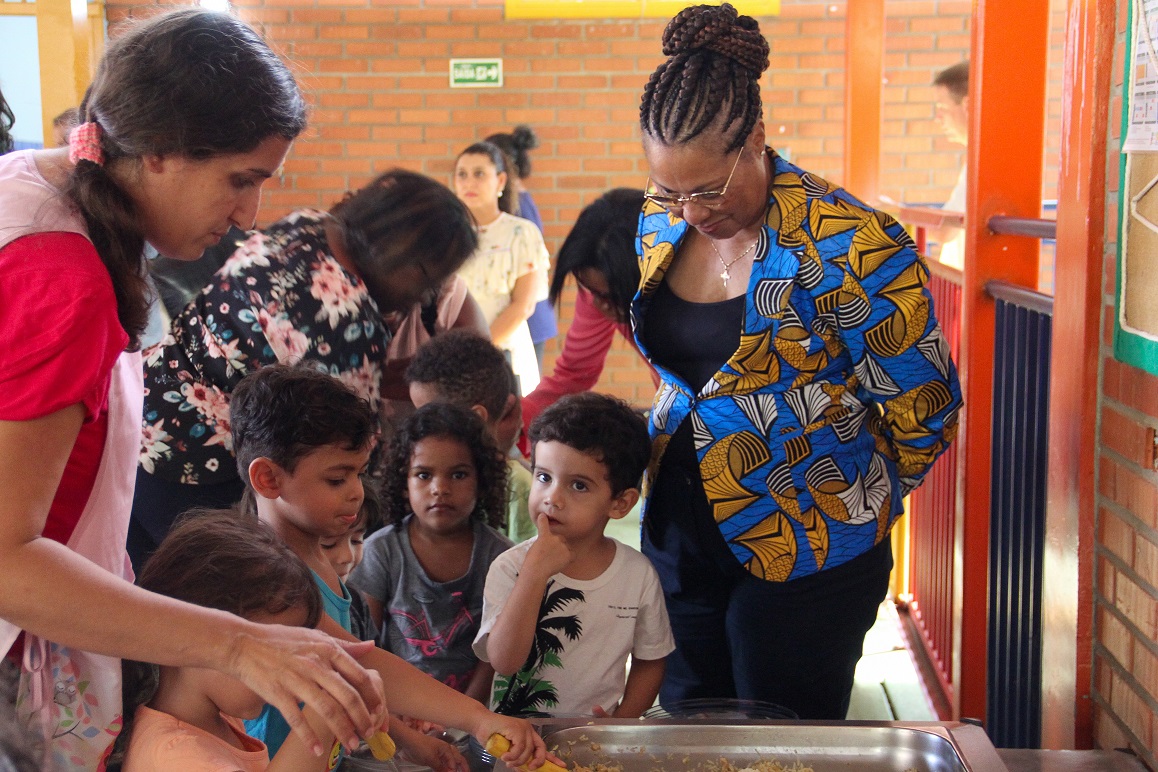
Between 4 and 7 December, the Angolan delegation participated in technical activities and field visits to learn about the Brazilian experience in the management of the National School Feeding Program (PNAE, in Portuguese), especially in the areas of monitoring, evaluation, accountability and purchasing mechanisms of family farming. The agenda included technical meetings and field visits in Brasília and Goiânia.
“This is our main goal: to see how it works in Brazil, which is a huge country and has a great diversity, therefore with some similarities to ours, to overcome some of the challenges we have with this school feeding programme,” said Luisa Grilo, Minister of Education in Angola.
José Ferrão, WFP Country Director in Angola, stressed that WFP has supported Angola in providing technical support to farmers and improving agricultural practices. “We are working with some schools on methods used with small producers. We have purchased large quantities of seeds and agricultural implements and we are seeing very positive results,” he said. “We’ve also been doing awareness campaigns, but it’s a process. Angola is on the right track, and we need to see good experiences to improve some procedures, especially in the areas of monitoring and evaluation,” he added.
The visit is part of the activities planned under the partnership between the United Nations World Food Programme (WFP) Centre of Excellence against Hunger, the National Fund for Education Development (FNDE) and the Brazilian Cooperation Agency (ABC). The Angolan delegation was led by the Minister of Education, Luisa Grilo, with the support of the National Director of Pre-School and Primary Education, Soraya Kalongela. Also in attendance were José Ferrão, WFP Country Director in Angola, and Gracy Heijblom, Programme and Policy Officer in WFP Angola, as well as representatives from the Angolan Embassy in Brasilia.
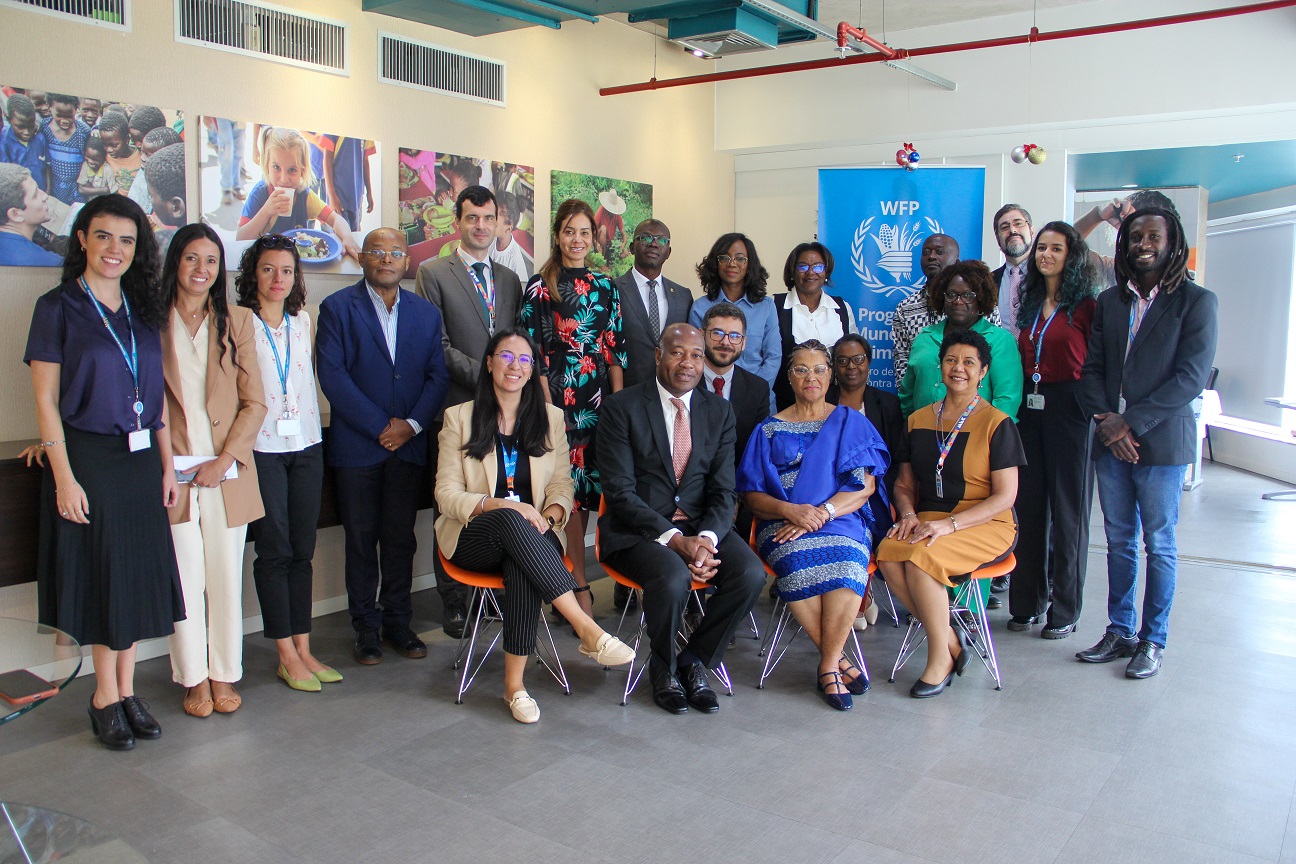
Experience exchange
The World Food Programme began supporting Angola in the 1990s with a pilot project that soon became the first version of the school feeding programme. At the end of the decade, the programme was expanded with support from the WFP, and in 2002, with the end of the civil war, the country revised public policies to lift the population out of poverty. In 2006, Angola took over the management of the programme and, in 2013, a presidential decree began to regulate school feeding.
In 2014, a delegation from Angola came to Brazil for a study visit organized by the Centre of Excellence against Hunger, in partnership with the Brazilian government. As of 2015, the resources allocated to school feeding began to be decentralized. In 2018, a new decree approved the integrated programme, and the following year, a new memorandum of understanding between Angola and WFP for technical assistance in school feeding and local agriculture purchases was signed. In 2022, Angola participated in the “Virtual Study Visit: Brazil”, to deepen knowledge about the Brazilian school feeding expertise.
During the seminar to exchange experiences, Soraya Kalongela, National Director of Pre-School Education and Primary Education of the Ministry of Education, presented an overview of the evolution of the Angolan school feeding programme and the main challenges. Currently, according to the Director, the programme is undergoing a transition from ready-to-eat snacks to hot meals prepared locally in schools or in community kitchens. The Angolan school feeding programme has multisectoral management and decentralized financing and includes 1,890,610 students served in 164 municipalities.
On the first day of activities, the delegation participated in technical meetings with several Brazilian agencies involved in the implementation and control of school feeding. Edenilza Costa, Coordinator of Monitoring and Evaluation of the PNAE, and nutritionist Tainá Marchewicz presented the programme, the specificities of management, financing and monitoring, and the components of food and nutrition education activities.
Edenilza Costa highlighted the role of the collaborating centres in school feeding and nutrition, known as Cecanes, which support monitoring and guidance activities, with the participation of nutritionists. Periodically, the members of the Cecanes make visits to the schools and participate in meetings with the school feeding councils. Next, Tainá Marchewicz presented examples of food waste management food and the appreciation of the work of cooks, together with nutritionists, in the preparation of nutritious and interesting menus for students.
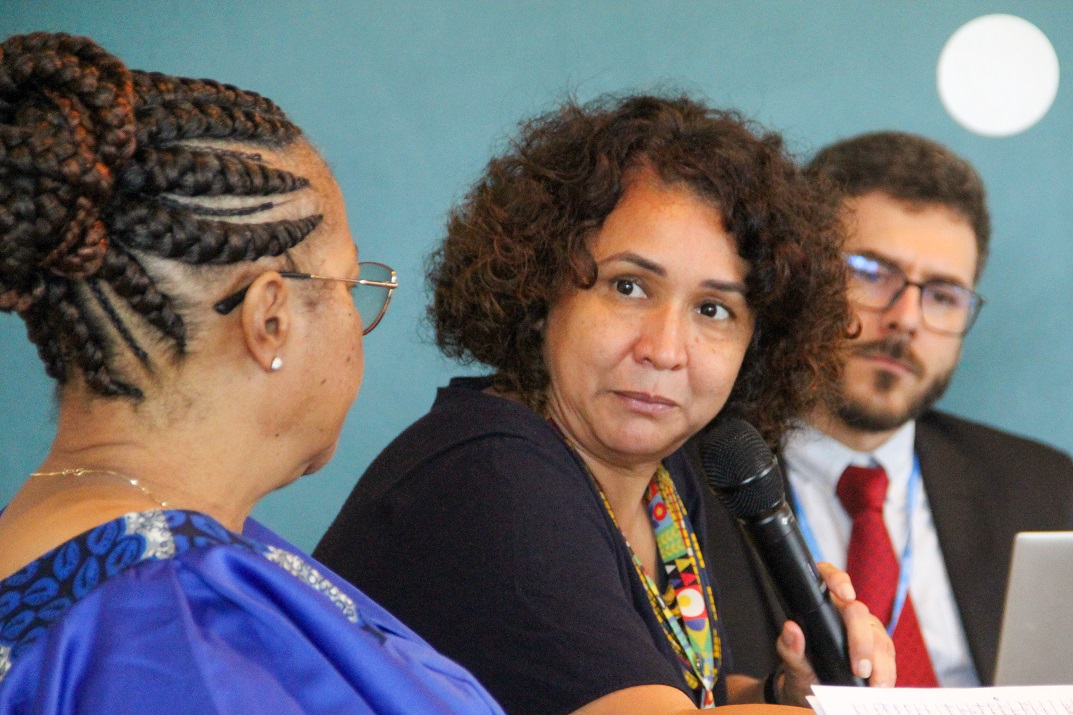
The Extraordinary Secretary for the Fight against Poverty and Hunger of the Ministry of Development and Social Assistance, Family and Fight against Hunger (MDS), Valeria Burity, also participated in the meeting. She presented the National Food and Nutrition Security System (SISAN, in Portuguese), which aims to act in the management and monitoring of food security policies, at the federal and local levels. Valeria Burity also explained how SISAN dialogues with the PNAE, since the National Council for Food and Nutrition Security (Consea, in Portuguese) is responsible for presenting society’s demands for the improvement of public policies. “The council was fundamental for the creation of the PNAE and today it is fundamental for monitoring the programme,” said Valéria Burity.
The agenda of the first day included speeches by Mônica Salmito, Trilateral South-South Cooperation with International Organizations Project Analyst at the Brazilian Cooperation Agency (ABC), Maria Francisca Trujillo and Gustavo Servilha, from the Ministry of Education of Brazil, Poliana Maia de Paiva, Federal Public Defender, Adalberto Felinto da Cruz Neto, General Coordinator of Audit of the Areas of Basic Education, Citizenship and Tourism of the Federal Office of the Comptroller General, and André Geraldo Carneiro de Oliveira, Auditor of the Federal Court of Auditors. The work of the Centre of Excellence was presented by Felipe Albuquerque, Nayla Almeida and Osiyallê Rodrigues.
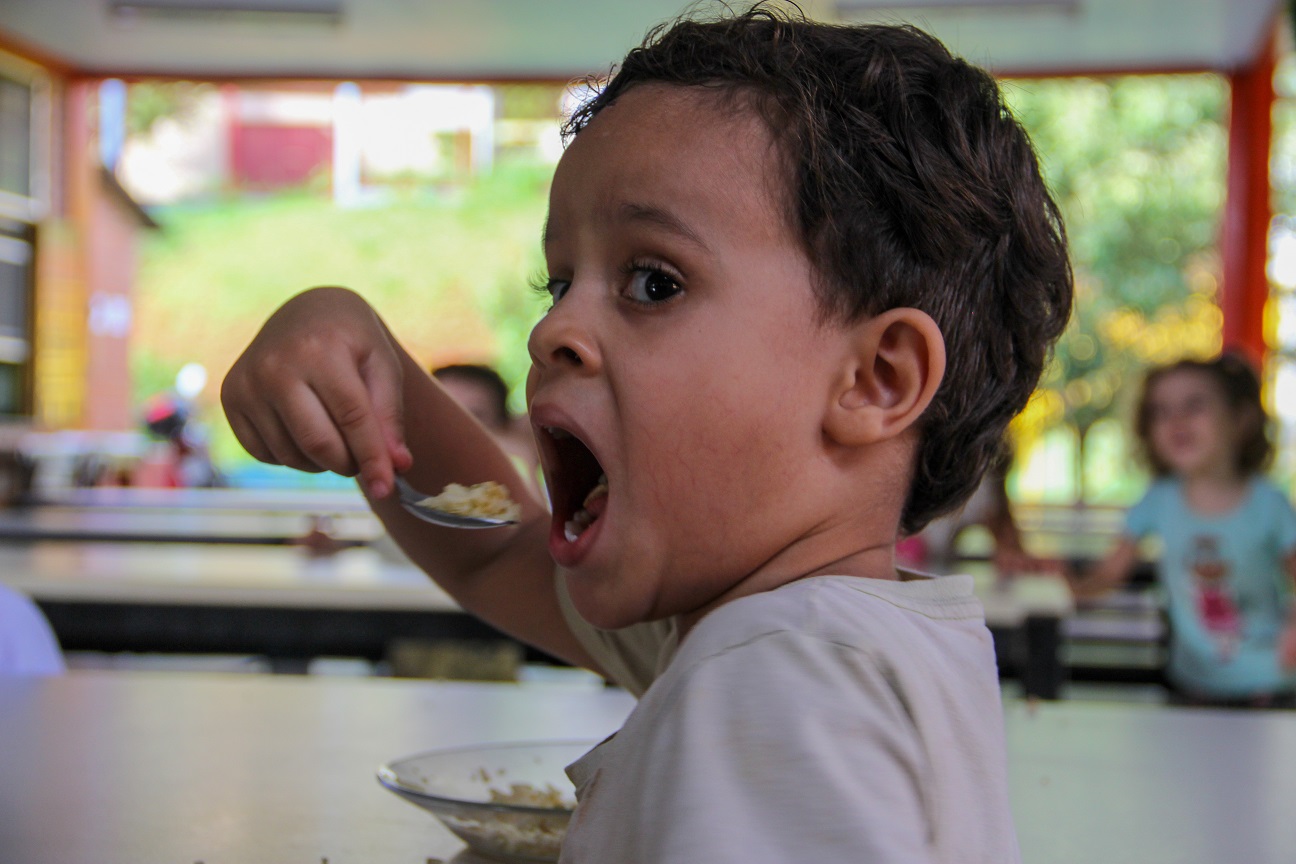
Field Visit
Between December 6th and 7th, the Angolan delegation carried out a field visit to Goiânia to see in practice how the school feeding system works and the performance of the Collaborating Centre in School Feeding and Nutrition (Cecane), at the Federal University of Goiás. The delegation was welcomed by the Dean Angelita Pereira de Lima, the Deputy Dean of Extension and Culture Adriana Régia, the Director of the School of Nutrition (Fanut) Ana Tereza Vaz and the coordinator of Cecane-UFG, Thaísa Anders Carvalho.
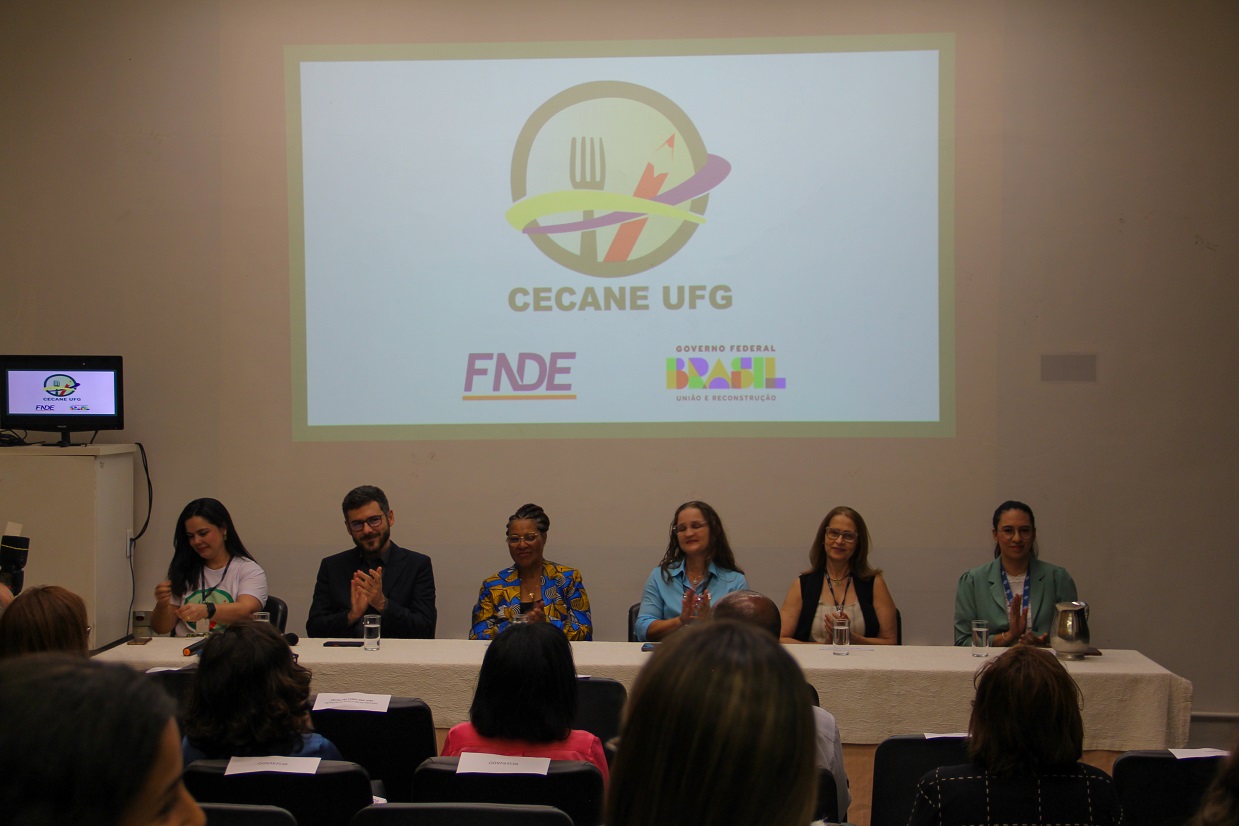
Upon arriving at the University, the representatives were welcomed with an agroecological breakfast provided by local family farmers part of the Interinstitutional Agroecological Fair project, with typical products from the cerrado, such as seriguela, cajá-mango juice, dehydrated banana, Minas cheese and pumpkin bread, among other delicacies. In addition, they were able to participate in a meeting with family farmers who supply food to the PNAE to understand how the public call for the supply of food for school meals takes place and the main challenges faced.
The delegation also visited two schools in Goiânia. The first was CEMEI Residencial Itamaracá, which serves 151 students up to 3 years old, full-time, offering five meals. Then, they visited the Professora Maria Nosídia Palmeiras das Neves Municipal School, which serves 284 students between 6 and 10 years old, offering three meals a day. This school has a vegetable garden maintained by the students, which is part of the food and nutrition education activities.
On the last day of the field visit, the delegation participated in a training meeting involving the PNAE, the municipality of Goiânia and 16 neighbouring municipalities. Topics such as the history of the PNAE, the attributions of the nutritionists who work in the Programme and the role of the School Feeding Councils (CAE) were addressed.
The Angolan government’s partnership with the WFP Centre of Excellence and the Brazilian government will continue with the definition of priorities for subsequent technical support, which should involve the redesign of parts of the national school feeding programme and the definition by the Angolan Ministry of Education of the areas of intervention.

